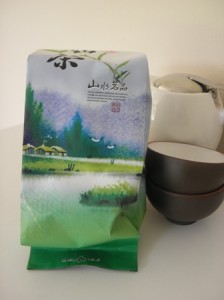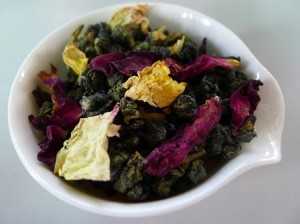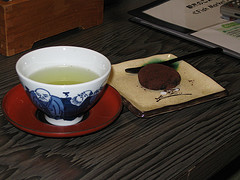Two great new tea products I am promoting this month include a new green tea; Strawberry Green tea and a scented oolong; Natural Rose Oolong tea. As the names imply, both have subtle flavours with the Strawberry Green tea being a scented tea (the strawberry scent is added to the green tea) and the Rose Oolong a natural tea that has rose petals added in with the oolong tea.

The packaging of both teas (which sell in 100 gm packs) is great with the Rose Oolong vacuum packed and the Strawberry Green tea loosely packaged. For anyone who likes scented or flavored teas these would be an ideal choice.
The flavouring of the green tea minimises the ‘green tea’ taste that many green teas have. While some people enjoy the more earthy flavour of green tea, many people would prefer something a little less strong. Let’s face it, lots of people drink green tea or oolong tea because they know they are a healthy drink alternative and they actually benefit a person health-wise, being full of anti-oxidants and having little to no caffeine. Still, the taste can be a little off-putting for people at first, especially those who have been drinking coffee or black tea all their lives. This green tea is lightly blended with strawberry essence to bring out the light aroma and taste–a simply delicious, healthy tea!
The Rose Oolong is a fresh, naturally cultivated tea. Rose petals are added to premium hand-picked Jin Xuan

Oolong tea. The process requires 2 to 3 days for the tea to properly absorb the aroma from the rose petals. The Jin Xuan Oolong tea used in this batch is freshly harvested spring 2012 oolong tea from the Nan Tou tea growing region in central Taiwan. While the aroma and taste add to this already excellent oolong tea, one of the things that I love about the tea is that you can see the small rose petals in the tea — it really is a very pretty tea, as well as being a healthy choice for those who like the slightly more oxidised oolong tea.
The product page will include more details regarding where the tea was grown, at which elevation, etc. I am also including photos here of the packaging and a sample of the actual Rose oolong tea in which you can see the rose petals blended with the oolong tea. Unfortunately, at present, I do not have a clear photo of the green tea however in general the leaves are unfurled which is why the packaging appears larger — it is loosely packaged as opposed to being vacuum packed. Both packs contain 100 gram of tea however.
The Rose Oolong tea is more costly than the Strawberry Green tea, mainly because the tea base is a very high grade tea.
Prices:
Rose Oolong Tea – 100 gm: $15.99
Strawberry Green Tea – 100 gm: $10
Orders for these teas will be shipped within 1 to 2 working days, with shipping to most parts of Australia only taking a couple of days.

